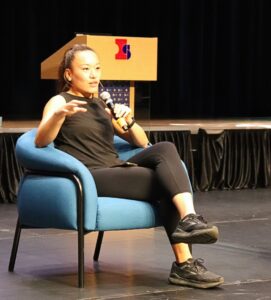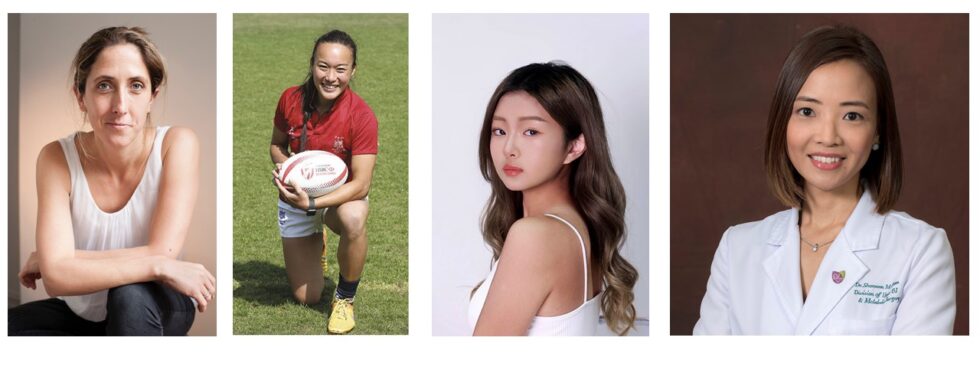Inspiring Speakers on International Women’s day
The Girls Rising group hosted four outstanding speakers on International Women’s Day, 8 March 2024. The speakers, all from very different backgrounds, told remarkable stories of overcoming challenges and how they became stronger because of it.
Each week we will introduce a different speaker. This week we meet former Hong Kong Rugby Captain, Christy Cheng. Cheng talks about the tough demands of training to be an international athlete but her answer to the question, what does it mean to be a strong woman – was surprising!

—
Christy Cheng is a former Hong Kong Rugby professional player. Throughout her 16 year career, she represented and captained Hong Kong in both the 7s and 15s teams. She is now a mother, a personal trainer and a strength and conditioning coach. Alongside her coaching, Christy also supports the charity Operation Breakthrough which aims to use sports as a medium to help teenagers at risk.
Cheng came to rugby relatively late, at 16 years old, soon afterwards she took a break to focus on studying. She returned to the sport at 21. At her trials for the national team (at age 21) the coach asked her what position she played – Christy could not answer because she had never been in a proper team before.
From age 22-28 Christy spent two evenings a week rugby training and every morning at the gym before starting work at the office. But everything changed when the Rugby Sevens became an olympic sport. The Hong Kong government accepted women’s rugby into the Sports Institute. From that point on women rugby players were offered full time contracts!
Cheng said, “There were 14 contracts on the table and I took one straight away. I knew I would never get this opportunity again so I just went for it.”
Cheng described some of the challenges of being a female rugby player in a male dominated sport. She explains the testosterone in the weights room, the feeling of not belonging and issues with body image.
She said, “Female athletes look at their bodies a lot. I had teammates that refused to put on weight, refused to put on muscle, so they can still get their thighs into their jeans. The approval that women seek from others is hurting us.”
“I think I have overcome this challenge because I am proud of my own work and proud of what I have done. I went to the gym because I had a dream to be a better athlete. I put on the Hong Kong jersey and I represented HK on the international stage. I do not bother with others that judge me for the way I look. They don’t know me and they don’t know my story.”
So what does it mean to be a strong woman? Christy’s answer might surprise you. She said, “After I had the baby it made me realise how strong a woman can be. Men don’t understand the physical demands of being a mum. First there is pregnancy where your body changes and you do not feel like you any more. Motherhood is mentally and physically hard. Women want to be good in so many different areas. They want to be a good mum, have their own career and be a good wife and knowing how to juggle it all is so difficult.
I want to be Christy but my identity has changed and I have become mummy. I lost my identity after having a child – but being a strong woman means you understand that you are doing your best in different areas of your life.”
Her advice to younger people. “Don’t ever lose yourself, and remember you are working hard for you. And say yes to opportunities.”
“There are many companies and organisations trying to push women forward which is important. Some women don’t believe that they can do it. Even if you think you don’t belong in a field or industry, say yes. When you get there you will learn and you will prove to yourself and to others that you belong.”
Cheng – works with NGO Operation Breakthrough, which started 20 years ago and is linked to the police force. Operation Breakthrough uses sport to help young offenders aged 12-18. She said “We give the kids a second chance and get them involved in different sports. There are coaches and there are the volunteer police who are good role models. I think sports can bring a lot of good things out in people. They can learn how to deal with the challenges of life by going through the challenges of competitions or training. Hopefully it will help them take a new direction in life.”
She finished by saying she wishes she was kinder to people. “When I was 21 I was good at rugby and I was not kind to the senior players. The senior players were the trailblazers for the sport. I would not be where I am now without them. I should have been really grateful to them but instead I was getting frustrated that they were not trying hard enough.”
I should have been grateful to the trailblazers that paved the way for me and my team mates. I count myself very lucky that I was a full time athlete.”
In the future she hopes for better inclusion – women playing on the same pitch as men and their games promoted and advertised.

